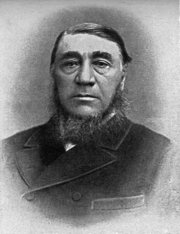Paul Kruger
|
|
Stephanus Johannes Paul Kruger (10 October 1825 – 14 July 1904), fondly known as Oom Paul (Afrikaans for "Uncle Paul"), was a prominent Boer resistance leader against British rule and president of the Transvaal Republic in South Africa.
| Contents |
Youth
Kruger was born to a family of Prussian descent at Bulhoek, his grandfather's farm in the Steynsburg district, and grew up on the farm Vaalbank. He received only three months' formal education, his master being one Tielman Roos, but became knowledgeable from life on the veld. His father, Casper Kruger, joined the trek party of Hendrik Potgieter when the Great Trek started in 1836.
The trekkers crossed the Vaal River in 1838, and at first stayed in the area that is known today as Potchefstroom. Kruger's father later decided to settle in the district now known as Rustenburg. At the age of 16, Kruger was entitled to choose a farm for himself at the foot of the Magaliesberg, where he settled in 1841.
The following year he married Maria du Plessis, and the young couple accompanied his father to live in the Eastern Transvaal for a while. After the family had returned to Rustenburg, Kruger's wife and infant son died, probably from malaria. He then married Gezina du Plessis, who was his constant and devoted companion until her death in 1901. Seven daughters and nine sons were born of the marriage, some dying in infancy.
Leadership
In time, Kruger emerged as a leader. He started as a field cornet in die commandos, eventually becoming Commandant-General of the South African Republic. He was appointed member of a commission of the Volksraad, the republican parliament that was to draw up a constitution. People began to take notice of the young man and he played a prominent part in ending the quarrel between the Transvaal leader, Stephanus Schoeman, and M.W. Pretorius. The latter afterwards became the first President of the South African Republic and founder of Pretoria, which he named after his father, Andries Pretorius.
In 1873, Kruger resigned as Commandant-General, and for a time he held no office and retired to his farm, Boekenhoutfontein. However, in 1874 he was elected to the Executive Council and shortly after that became Vice-President of the Transvaal.
After the annexation of the Transvaal by Britain in 1877, Kruger became the leader of the resistance movement. During the same year, he visited England for the first time as leader of a deputation. In 1878, he was part of a second deputation. A highlight of his visit to Europe was when he ascended in a hot air balloon and saw Paris from the air.
The first Boer War, also known as the "War of Independence", started in 1880, and the British forces were defeated in the decisive battle at Majuba in 1881. Once again, Kruger played an important role in the negotiations with the British, which led to the restoration of the Transvaal's independence under British sovereignty.
On 30 December 1880, at the age of 55, Kruger was elected President of the Transvaal. One of his first aims was the revision of the Pretoria Convention of 1881, the agreement between the Boers and the English that ended the First Boer War. Therefore, he again left for England in 1883, empowered to negotiate with Lord Derby. Kruger and his companions also visited the Continent and this visit became a triumph in countries such as Germany, Belgium, the Netherlands, France and Spain. In Germany, he attended an imperial banquet at which he was presented to the Emperor, Wilhelm I, and spoke at length with Bismarck.
In the Transvaal, things changed rapidly after the discovery of gold on the Witwatersrand. This momentous discovery was to have far-reaching political repercussions and to give rise to the uitlander, or foreigner, problem, which was eventually to cause the fall of the Republic. Kruger is reputed to have predicted the events that were to follow afterwards, declaring that instead of rejoicing for the discovery of gold, they should be weeping because it will "cause our land to be soaked in blood."
At the end of 1895, the failed Jameson raid took place; Jameson was forced to surrender, taken to Pretoria and handed over to his British countrymen for punishment.
In 1898, Kruger was elected President for the fourth and last time.
Exile
On 11 October 1899, the Second Boer War broke out. On 7 May the following year, Kruger attended the last session of the Volksraad, and left Pretoria on 29 May as Lord Roberts was advancing on the town. For weeks he either stayed in a house at Waterval-Onder or in his railway carriage at Machadodorp in the then Eastern Transvaal, now Mpumalanga. In October, he left South Africa on the battleship De Gelderland, sent by the Dutch Queen Wilhelmina. His wife was too ill to travel and remained in South Africa; she died on 20 July 1901.
Kruger went to Marseilles and stayed for a while in The Netherlands, before moving to Clarens, Switzerland, where he died on 14 July 1904. He was buried on 16 December 1904 in the Church Street cemetery, Pretoria.
Legacy
His former Pretoria residence is now the Kruger House Museum.
The Kruger National Park is named after him, as is the Krugerrand coin, which features his face and the "Oom Paul pipe", named after the style of pipe he smoked.
In 2004 he was voted 27th in the Top 100 Great South Africans poll conducted by the South African Broadcasting Corporation.
See also
External links
- Brief biography (http://www.krugerpark.co.za/paul-kruger-history.html) on the Kruger National Park web page (http://www.krugerpark.co.za/)
- Longer biography (http://www.nfi.org.za/KM/khkruger.htm) at the Kruger House Museum web site (http://www.nfi.org.za/KM/)
af:Paul Kruger cs:Paul Kruger de:Paul Kruger fr:Paul Kruger nl:Paul Kruger sl:Paul Kruger

